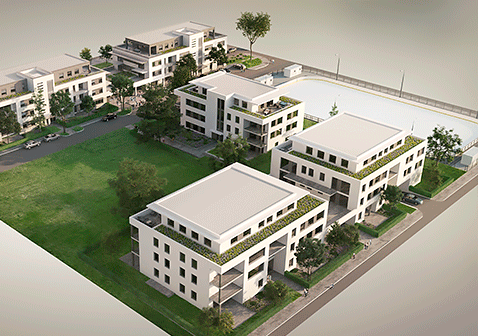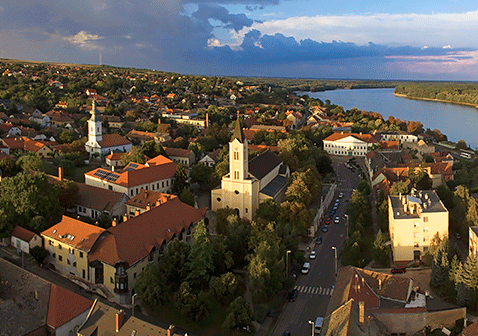The project
The Residential Park
Specifications
As the single most significant comprehensive residential development in Paks to date, Gesztenyés Park offers a stylish environment and quality living spaces for tenants and owners.
The A+ energy rating of the flats ensures low energy consumption with district heating and individual heat meters to optimize running costs. Flats can be customized to fit individual needs including the installation of automated and intelligent systems.
Each block in the building is equipped with an elevator and an underground garage. Underground parking enabled designers to create spacious communal areas including a tranquil garden and a playground.
The total number of flats in the five blocks: 77 (total area: 7,046.1 m2).
The area of the flats ranges from 42.6 to 136.5 m2.
The number of planned parking spaces: 152 in total (surface + underground).
Ground floors in the blocks house 5 retail or service properties (total area: 348.6 m2).
Construction begins in 2017
Construction shall be carried out in two phases:
Phase 1: 32 flats, 78 parking spaces and 5 ground floor retail or service properties located parallel to Gesztenyés Street.
Phase 2: 45 flats and 74 parking spaces.

Paks
Following Szekszárd, Paks is the second largest city in Tolna County, bordered by Imsósi-erdő (Imsós Forest) and Sánc-hegy (Sánc Hill) – one of the largest loess formations in Central Europe – to the north; the River Danube to the east; Paks Nuclear Power Plant and Csámpa-puszta (Csámpa Plain) to the south; and Ürge-mező (Ground Squirrel Field), a protected landscape area, to the west.
The history of the city spans thousands of years from prehistoric civilisations to modern times and a military road along the Danube that once crossed the city made Paks a significant town for centuries to come.
Paks is famous for its Danube Swabian traditions and excellent fish soup. Despite being a small town, Paks hosts a significant number of events such as the Gastroblues Festival, Paksi Harmónika Fesztivál (the Accordion Festival, Paks) and Szüreti Felvonulás és Mulatság (the Harvest Procession Festival).
In 1995, Paks earned the title of Nemzeti Sportváros (National Sport City), and a number of sports clubs in Paks have raised top athletes, even world and Olympic champions in their professional departments, including judo, kayak and canoe, chess and boxing. The Paks basketball team is a three-time national champion and the soccer team is in the professional league.
The city’s highest point is the 103-meter-high loess hill, Sánc-hegy, which is under protection as one of the largest loess formations in Central Europe. The fines wines of Tolna County are produced on Sánc-hegy, whose terroir matches that of the Szekszárd Hills.
Historically an oppidum (‘market town’), Paks went through remarkable development with the building of the nuclear power plant, yet the city preserved its natural, liveable character. It provides all the services and conveniences of a modern city without stress of traffic and crowds.
Paks is just over an hour’s drive from Budapest on motorway M6, and Road 6, which connects the capital with the city of Pécs, offers a scenic route along the Danube. Paks is situated in an ideal position for transport as evidenced by a number of historical events including the fact that the military roads built by the Romans led across Paks. Access to the River Danube and the water route to Buda also placed Paks in a strategic military position throughout the centuries.
Built between 1969 and 1987, Paks Nuclear Power Plant made Paks the most dynamically developing city in Hungary. This development will gain further momentum with the recently approved expansion of the Power Plant.
